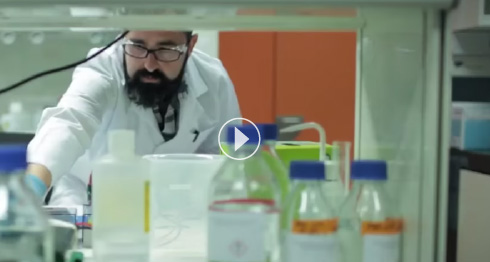




Scientists at Repsol work to synthesize molecules with improved energy properties
Using information provided by microorganisms to anticipate the presence of hydrocarbons or to improve the production of a reservoir are some of the applications of biotechnology in the oil industry. The Repsol Technology Center makes use of the latest advancements in information technology and robotics to design custom molecules, which can also give rise to new polymers or bio-inspired materials.
The progress in "the design, synthesis, and manipulation of DNA and the development of computational biology make it possible to talk today about an advanced biology that opens up new possibilities in areas like energy," declares María del Mar Gonzaález, researcher in the biotechnology field at the Repsol Technology Center.
Biotechnology "provides access to smoother processes with less impact on the environment. In addition, the biological reactions are very selective," which makes it possible to obtain unique molecules with the desired properties. This potential makes biology one of the avenues for future research in new forms of energy.
Advanced biology: new opportunities for the energy industry
used to simulate new enzyme structures before stepping into the laboratory


The robots Marilyn and Jack have quintupled |

Bio-inspired materials that absorb light to imitate photosynthesis have been created |
Using bioinformatics to design new enzymes
Scientists of different specialties, such as metabolic engineering, enzyme engineering, and computational biology, meet in the Advanced Biology Laboratory of the Repsol Technology Center. Over four years ago, they started a multidisciplinary project that highlights "our abilities to obtain enzymes that carry out new activities or to optimize the properties they already have," adds González.
Enzymes are organic molecules that catalyze chemical reactions, which is why they are of particular interest for energy companies. In nature, these molecules act in a very limited range of conditions; the objective of biotechnologists is to improve their catalytic activity in order to adapt to the industry's needs by accelerating reactions, increasing productivity, or making them work under very extreme conditions.
Researchers use IT tools such as simulation and three-dimensional modeling to identify enzymes with industrial possibilities and study how to modify them. Thanks to bioinformatics techniques, it is possible to virtually test a high number of variants, shortening research processes.
Marilyn and Jack, the research robots
After identifying the changes that must be made, thousands of enzymatic variants are created in the laboratory. The small variations in the chemical structure of these molecules must be tested until the modification that produces the desired results is found.
Thus, robotics has brought about another fundamental innovation that makes it possible to take on biotechnology projects that were unfeasible until now. Test automation multiplies laboratories' testing abilities and allows them to repeat experiments with great precision.
The biologists at Repsol have two high-performance robotic platforms, which have been given the names Marilyn and Jack, that can carry out up to 10,000 tests each week. They work 24 hours a day in a coordinated way until they find the desired new catalytic activity.
Using bioprospection to search for reservoirs
Among the applications that are being developed, the scientists at the Repsol Technology Center study how the presence of certain microorganisms on the surface can be a very revealing indication of the presence of petroleum or gas in the subsurface.
Until recently, bioprospection was inconceivable because in order to study the microorganisms present in the subsurface, it was necessary to cultivate them, which was very complex due to the extreme conditions in which they live. But thanks to techniques such as metagenomics and massive sequencing, it is now possible to identify the composition of these species and detect their presence by using traces of their DNA.
This technique prepares "a microbiological database of different exploration campaigns that connects them to the presence of petroleum or gas." The development and lower prices of these technologies make biological prospection a tool that, combined with other geological, geochemical, and geophysical techniques, will be able to help increase exploratory success.
In the case of well production, the microbiological profile of the first extracted samples will provide more information about the reservoir characteristics, such as the type of rock or the quality of the hydrocarbons, which could help the decision-making process for improving the exploration.
Using custom molecules to create new materials
In the near future, custom molecules will also be synthesized, making the most of the advantages offered by biological systems. In a research field that is becoming more and more important for the energy sector, biotechnology is advancing in the design of components that are not possible with traditional chemical processes.
Biodegradable plastics based on the activity of bacterias, new biofuels and biolubricants or materials inspired by natural structures or processes such as those that are able to absorb light and imitate photosynthesis have already been created.
 | |
| Download all the images in this News | |
 ZIP. 3,2 Mb ZIP. 3,2 Mb | |
 | |
| Download the complete articles in this News | |
 PDF. 2,8 Mb PDF. 2,8 Mb | |
Dirección de Comunicación |
Campus Repsol · C/ Méndez Álvaro, 44 |